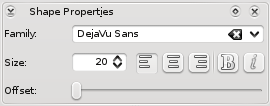Karbon/Tutorials/Artistic Text Shape/fr: Difference between revisions
Created page with "Après avoir ajouté la forme, vous pouvez éditer le texte et afficher un résulltat plus intéressant. Pour cela, vous devez activer l'outil <menuchoice>outil de forme de te..." |
Created page with "centré" |
||
| Line 19: | Line 19: | ||
Après avoir ajouté la forme, vous pouvez éditer le texte et afficher un résulltat plus intéressant. Pour cela, vous devez activer l'outil <menuchoice>outil de forme de texte artistique</menuchoice>, soit en double-cliquant sur la nouvelle forme, soit en sélectionnant [[Image:Artistictext-tool.png]] dans la boîte d'outils. Puis, vous pouvez changer le texte pour obtenir un résultat de ce genre. | Après avoir ajouté la forme, vous pouvez éditer le texte et afficher un résulltat plus intéressant. Pour cela, vous devez activer l'outil <menuchoice>outil de forme de texte artistique</menuchoice>, soit en double-cliquant sur la nouvelle forme, soit en sélectionnant [[Image:Artistictext-tool.png]] dans la boîte d'outils. Puis, vous pouvez changer le texte pour obtenir un résultat de ce genre. | ||
[[Image:Boring-artistic-text-shape.png| | [[Image:Boring-artistic-text-shape.png|centré]] | ||
{|class="tablecenter vertical-centered" | {|class="tablecenter vertical-centered" | ||
Revision as of 11:19, 26 August 2012
This tutorial will present you what you can do with the . While this tutorial was done using Karbon, the shape is available in other KOffice applications, and will work in a similar way. Ce tutoriel vous expliquera ce que vous pouvez faire avec le . Bien que ce tutoriel ait été réalisé en utilisant Karbon, cette forme est disponible dans d'autres applications Koffice, et fonctionnera de manière similaire.
Dans cette leçon, vous apprendrez à
- créer une forme texte
- associer une forme texte à un emplacement
Première étape avec une forme texte
 |
Pour ajouter une forme texte artistique, aller dans le menu , cliquer sur l'icône , et la tirer-déposer dans le canevas. |
Après avoir ajouté la forme, vous pouvez éditer le texte et afficher un résulltat plus intéressant. Pour cela, vous devez activer l'outil , soit en double-cliquant sur la nouvelle forme, soit en sélectionnant  dans la boîte d'outils. Puis, vous pouvez changer le texte pour obtenir un résultat de ce genre.
dans la boîte d'outils. Puis, vous pouvez changer le texte pour obtenir un résultat de ce genre.
After changing the to "Steve", the to 30pt, and setting , you can have the following shape in your canvas:

Path follower
This is still a very straight, flat text. Now we want a curvy text. To do this, we will need to create a path, for instance, using the ![]() .
.
You should have something like this:

To associate the text with the curve, you need to activate the by double clicking on the text, or selecting  .
.
Then, if you move the mouse on top of the curve you will see the cursor changing to a hand, you will need to click on the curve. In the
docker, the icon ![]() is now enabled, and you need to click on it to attach the path. Using the offset in the docker, you can adjust the text to get the following result:
is now enabled, and you need to click on it to attach the path. Using the offset in the docker, you can adjust the text to get the following result:

You can detach the path by clicking on ![]() . You can , and the text. If you change the curve, then the text will be updated.
. You can , and the text. If you change the curve, then the text will be updated.


